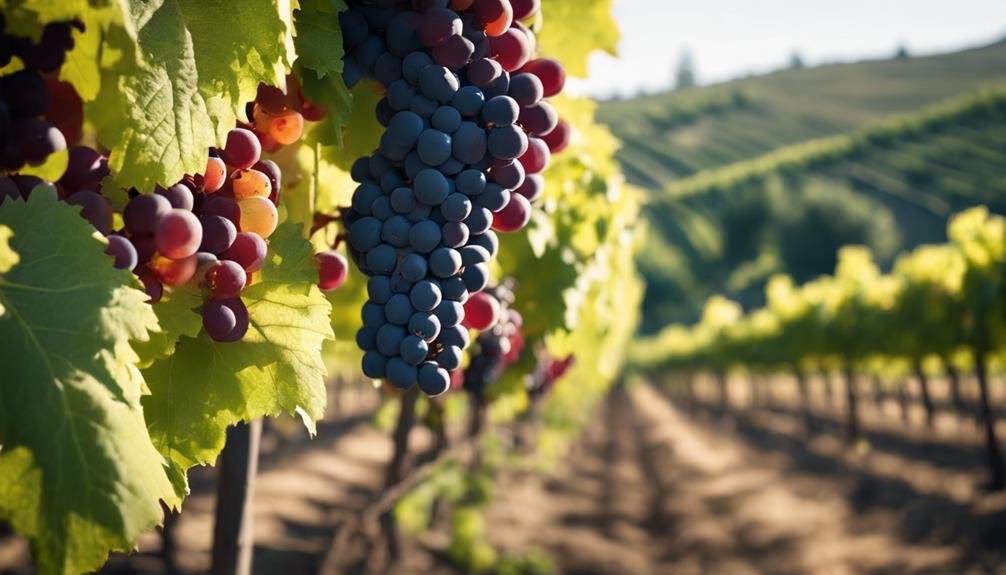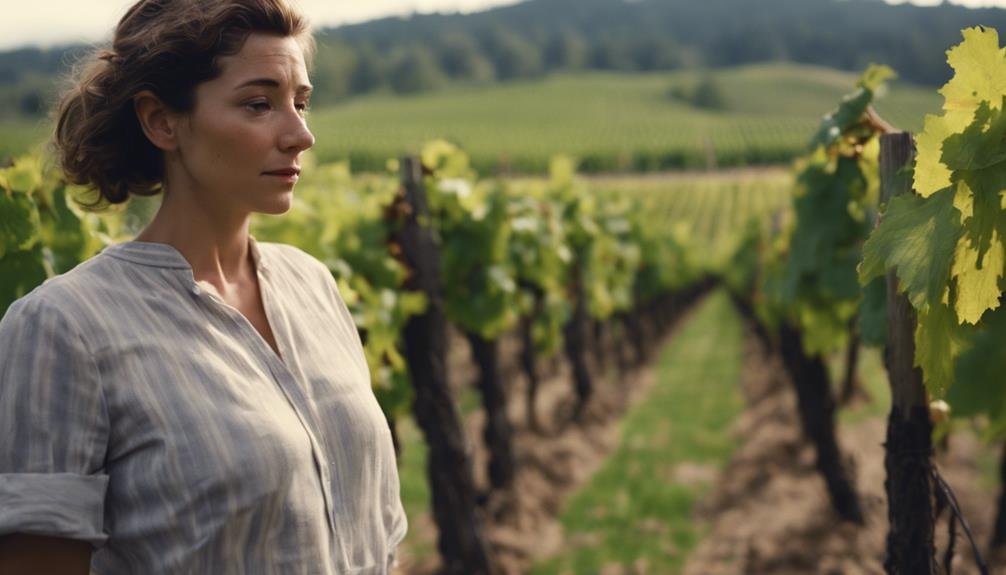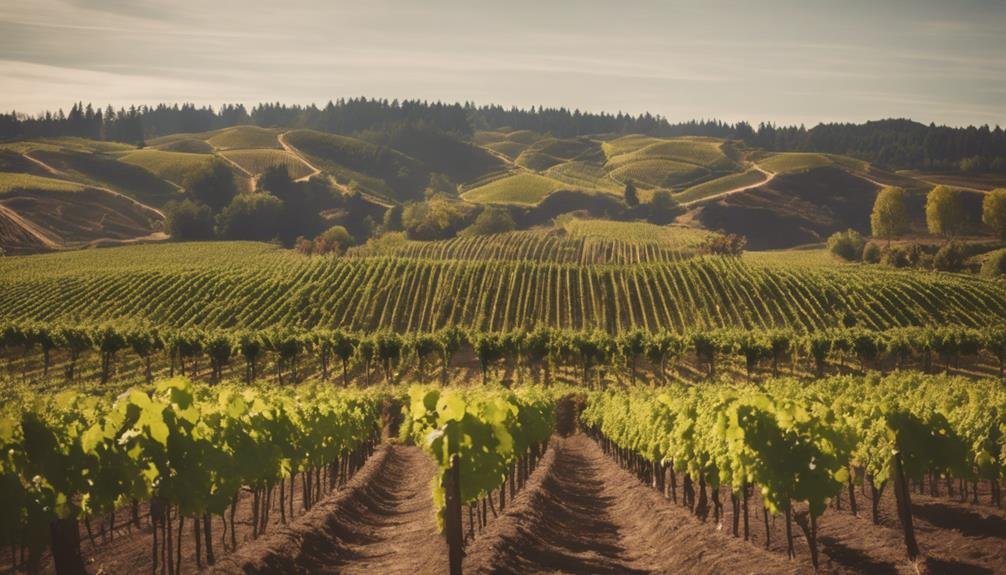Ancient cataclysmic floods near Lake Missoula in Washington have greatly influenced the terroir of the region. Erosion patterns and sediment deposits from these floods have shaped the land, creating an ideal environment for viticulture. The soil composition, characterized by deep and well-drained soil, supports grape varieties like Cabernet Sauvignon and Merlot, leading to wines with intense flavors and high acidity that set Washington wines apart. The unique terroir in Washington produces distinct characteristics in wines, with deep root structures interacting with the soil to produce age-worthy wines. Explore how these geological phenomena have impacted Washington's wine region.
Geological Impact of Ancient Floods
Evidently, the geological impact of ancient floods near ancient Lake Missoula in Washington has played a significant role in shaping the unique terroir of the region.
The cataclysmic floods at the end of the last ice age led to distinct erosion patterns and sediment deposits, forming what is now known as the 'Scablands'.
These floods brought in sediment, including the renowned 'Warden silt loam', contributing to the relatively young, 20,000-year-old soils of Washington.
The deep sediment deposits in river valleys have created an ideal environment for viticulture, with vines developing deep root structures in the nutrient-poor yet well-drained soil.
This geological history has resulted in mature vineyards with deep deposits producing some of the highest-rated wines in the region, exemplified by areas like Horse Heaven Hills.
Soil Composition and Viticulture
The soil composition in Washington's wine region plays a pivotal role in shaping the viticulture practices and ultimately the quality of wines produced.
With deep deposits and low nutrient levels, vines in Washington develop deep roots, leading to nutrient-rich vines. This characteristic influences the growth of mature vineyards, contributing to the production of highest-rated wines, as seen in regions like Horse Heaven Hills.
The deep, well-drained soil allows grape varieties like Cabernet Sauvignon, Merlot, and others to thrive. These conditions support the cultivation of grapevines that produce intense flavors due to the struggle for nutrients, resulting in wines that are fresh, fruity, and high in acidity, setting them apart from those in California.
Grape Varieties Thriving in Washington

Thriving in the unique terroir of Washington State are a variety of grape cultivars that have found ideal conditions for growth and expression in the region's diverse soils and climate.
- Rising trends:
- Washington State is increasingly known for producing high-quality red and white wines.
- Winemakers are exploring unique grape varieties to expand the region's offerings.
- Consumers are showing a growing interest in Washington wines for their distinct characteristics.
- Climate challenges:
- Washington's 300 days of sun pose challenges for grape growers to manage vine stress.
- Cold nights maintain grape acidity, contributing to the wines' age-worthiness.
- Higher acidity in Washington wines compared to California can be a challenge for winemakers to balance in the final product.
Influence of Terroir on Wine Quality
An essential factor in determining the quality of wine is the influence of terroir, encompassing the specific environmental factors that shape the characteristics of a vineyard's grapes. Climate effects play a vital role in this, with Washington State's 300 days of sun in Eastern Washington contributing to the development of intense flavors in the grapes.
The root structure of vines is another key aspect influenced by terroir, with deep deposits in river valleys allowing vines to grow deep roots, leading to higher quality grapes. These deep deposits, like the 'Warden silt loam' left by the cataclysmic floods at the end of the last ice age, create well-drained, low-nutrient soils that are ideal for vine growth.
This unique terroir ultimately produces wines with higher acidity and age-worthiness compared to other regions.
Meet Madeline Puckette: Wine Expert

Internationally recognized for her expertise in wine communication and education, Madeline Puckette is a distinguished figure in the world of wine.
- Wine Pairing: Madeline Puckette provides valuable insights into pairing wines with various foods, enhancing the dining experience.
- Tasting Techniques: Known for her expertise in tasting techniques, Madeline Puckette educates on how to properly taste and appreciate different wines.
- Educational Resources: Through Wine Folly, Madeline Puckette offers a wealth of educational resources, including guides and articles, to help both novices and connoisseurs deepen their understanding of wine.
Frequently Asked Questions
How Do the Ancient Floods in Washington Compare to Other Wine Regions Geological History?
Ancient floods in Washington, akin to geological events in other wine regions, have shaped diverse terroirs with unique soil compositions. Varied climate variations demand innovative viticulture techniques to cultivate promising grape varieties, promoting exceptional wine production.
Are There Any Unique Grape Varieties Being Successfully Grown in Washington State?
In Washington State, rare varietals like Carménère and Counoise are thriving despite climate challenges. The region's experimentation with unique grape varieties showcases its adaptability and innovation, reflecting a commitment to pushing boundaries in winemaking.
How Does Washingtons Terroir Impact the Aging Potential of Its Wines?
The unique terroir of Washington, with its deep, well-drained soils and distinct microclimate, influences wine aging potential. Vines' deep roots in low-nutrient soil yield intense flavors. Viticulture practices and winemaking processes capitalize on this, enhancing age-worthiness.
What Sets Washington State Wines Apart From Those Produced in California?
Washington State wines stand out from California due to its unique climate differences and soil composition. Viticulture techniques emphasize deep-rooted vines thriving in low-nutrient, well-drained soils. This leads to distinctive wine styles with higher acidity, freshness, and age-worthiness.
Can I Book a Private Wine Tasting Session With Madeline Puckette Through Wine Folly?
Private wine tasting sessions with Madeline Puckette for wine education are available through Wine Folly. These events offer an exclusive opportunity to deepen your knowledge of wines in a personalized setting led by an acclaimed wine expert.
Conclusion
To sum up, it is worth noting that the ancient floods of Lake Missoula have left a lasting imprint on Washington's wine region, shaping its unique terroir and contributing to the success of its vineyards.
One fascinating statistic to bear in mind is that over 70 grape varieties are cultivated in Washington, showcasing the diversity and richness of its viticultural landscape.
These floods have truly played a pivotal role in establishing Washington State as a prominent player in the world of winemaking.
